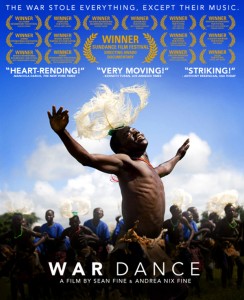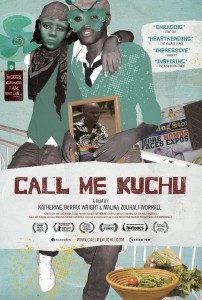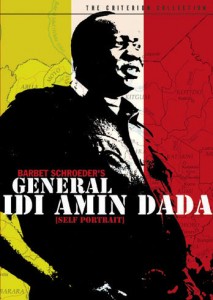Books:
1. Ethnomusicology in East Africa: Perspectives from Uganda and Beyond – Sylvia Nanyongo-Tamusuza, Peter Solomon
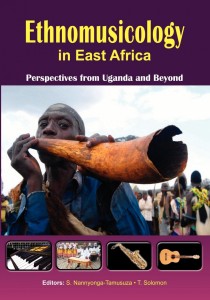 Ethnomusicology in East Africa is a first in this part of the world. It brings together thinkers and artists from Uganda, East Africa and further afield to discuss an area of vital importance to Africans as a people. The book presents selected papers from the First International Symposium on Ethnomusicology in Uganda, held at Makerere University in Kampala on 23-25 November 2009. The symposium, organised by the Department of Music, Dance and Drama (now the Department of Performing Arts and Film) of the university and the Grieg Academy-Department of Music at the University of Bergen, marked the end of the first period of the project Ethnomusicology in Uganda: Education, Research and Preservation of Cultural Heritage. Scholarly research on music in East Africa has a long history, stretching back to the beginnings of comparative musicology at the end of the Nineteenth Century during the colonial period. With the growth of the field of ethnomusicology after World War II, European and American researchers such as Klaus Wachsmann and Gerhard Kubik helped to consolidate East Africa’s place on the world musical map, through both historical study and fieldwork-based ethnographic research. This generation of scholars also shepherded regional music studies through the period of formal political decolonisation as the East African countries became independent in the early 1960s. An important development in the field since the turn of the twenty-first century has been the emergence of an increasing number of professionally trained scholars from East African countries who have contributed to the ongoing decolonisation of musical scholarship in Africa. These ethnomusicologists have made important contributions not only with their own original research in the region, but also in their work strengthening the institutional bases for ethnomusicology in East African countries. Their contributions include the establishment and consolidation of local college and university study programmes in ethnomusicology, their teaching of a new generation of East African students, and their vigorous international networking within the East African region and beyond. This book represents an important step in the continued professionalisation of ethnomusicology in Uganda. It presents new work by Uganda-based researchers, from students to academic staff, and solidly places that work within the international scholarly ethnomusicological conversation. We hope that the reader will find that this collection of papers is more substantial and coherent than the phrase ‘conference proceedings’ often implies, and that the work presented here will be regarded as a significant contribution to the study of music in Uganda and the wider East African region. With most of the contributions coming from scholars from East Africa, this collection thus confirms the decolonising trend toward ‘indigenous’ scholarship in ethnomusicology, where ‘we’ participate in writing ‘our’ own culture.
Ethnomusicology in East Africa is a first in this part of the world. It brings together thinkers and artists from Uganda, East Africa and further afield to discuss an area of vital importance to Africans as a people. The book presents selected papers from the First International Symposium on Ethnomusicology in Uganda, held at Makerere University in Kampala on 23-25 November 2009. The symposium, organised by the Department of Music, Dance and Drama (now the Department of Performing Arts and Film) of the university and the Grieg Academy-Department of Music at the University of Bergen, marked the end of the first period of the project Ethnomusicology in Uganda: Education, Research and Preservation of Cultural Heritage. Scholarly research on music in East Africa has a long history, stretching back to the beginnings of comparative musicology at the end of the Nineteenth Century during the colonial period. With the growth of the field of ethnomusicology after World War II, European and American researchers such as Klaus Wachsmann and Gerhard Kubik helped to consolidate East Africa’s place on the world musical map, through both historical study and fieldwork-based ethnographic research. This generation of scholars also shepherded regional music studies through the period of formal political decolonisation as the East African countries became independent in the early 1960s. An important development in the field since the turn of the twenty-first century has been the emergence of an increasing number of professionally trained scholars from East African countries who have contributed to the ongoing decolonisation of musical scholarship in Africa. These ethnomusicologists have made important contributions not only with their own original research in the region, but also in their work strengthening the institutional bases for ethnomusicology in East African countries. Their contributions include the establishment and consolidation of local college and university study programmes in ethnomusicology, their teaching of a new generation of East African students, and their vigorous international networking within the East African region and beyond. This book represents an important step in the continued professionalisation of ethnomusicology in Uganda. It presents new work by Uganda-based researchers, from students to academic staff, and solidly places that work within the international scholarly ethnomusicological conversation. We hope that the reader will find that this collection of papers is more substantial and coherent than the phrase ‘conference proceedings’ often implies, and that the work presented here will be regarded as a significant contribution to the study of music in Uganda and the wider East African region. With most of the contributions coming from scholars from East Africa, this collection thus confirms the decolonising trend toward ‘indigenous’ scholarship in ethnomusicology, where ‘we’ participate in writing ‘our’ own culture.
2. Abyssinian Chronicles – Moses Isegawa
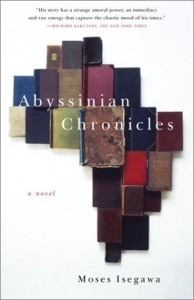 At the center of this unforgettable tale is Mugezi, a young man who manages to make it through the hellish reign of Idi Amin and experiences firsthand the most crushing aspects of Ugandan society: he withstands his distant father’s oppression and his mother’s cruelty in the name of Catholic zeal, endures the ravages of war, rape, poverty, and AIDS, and yet he is able to keep a hopeful and even occasionally amusing outlook on life. Mugezi’s hard-won observations form a cri de coeur for a people shaped by untold losses.
At the center of this unforgettable tale is Mugezi, a young man who manages to make it through the hellish reign of Idi Amin and experiences firsthand the most crushing aspects of Ugandan society: he withstands his distant father’s oppression and his mother’s cruelty in the name of Catholic zeal, endures the ravages of war, rape, poverty, and AIDS, and yet he is able to keep a hopeful and even occasionally amusing outlook on life. Mugezi’s hard-won observations form a cri de coeur for a people shaped by untold losses.
3. Waiting: A Novel of Uganda’s Hidden War – Goretti Kyomuhendo
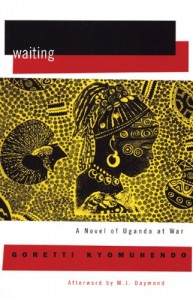 Set during the last year of the Ugandan dictator Idi Amin’s brutal regime, Waiting exposes the fear and courage of a small, close-knit community uncertain of what the edicts of a madman and the marauding of his uncontrollable army will bring with each coming day. As Amin’s war with Ugandan exiles and the Tanzanian army comes to an end, one family learns what it takes to survive and eventually to plan for a new life.
Set during the last year of the Ugandan dictator Idi Amin’s brutal regime, Waiting exposes the fear and courage of a small, close-knit community uncertain of what the edicts of a madman and the marauding of his uncontrollable army will bring with each coming day. As Amin’s war with Ugandan exiles and the Tanzanian army comes to an end, one family learns what it takes to survive and eventually to plan for a new life.
4. The Teeth May Smile but the Heart Does Not Forget: Murder and Memory in Uganda – Andrew Rice
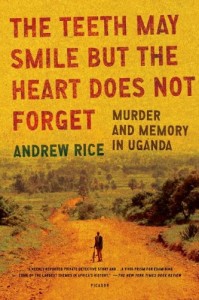 The people of Uganda have long struggled to bury the worst of their history, but after the violent reign of Idi Amin, reminders were never far from view. In 2000, lawyer Duncan Laki came across a clue to his father’s 1972 disappearance, and the ensuing search ultimately led him to a shallow grave — and then to three old soldiers, including Amin’s military chief of staff. Laki’s discovery resulted in a trial that, in the end, offered all Ugandans the reckoning they had long been denied. A detective story, a tale of fathers and sons, and a political history, this is above all an illumination of the wounded societies of modern Africa and an exploration of how — and whether — the past can ever be lain to rest.
The people of Uganda have long struggled to bury the worst of their history, but after the violent reign of Idi Amin, reminders were never far from view. In 2000, lawyer Duncan Laki came across a clue to his father’s 1972 disappearance, and the ensuing search ultimately led him to a shallow grave — and then to three old soldiers, including Amin’s military chief of staff. Laki’s discovery resulted in a trial that, in the end, offered all Ugandans the reckoning they had long been denied. A detective story, a tale of fathers and sons, and a political history, this is above all an illumination of the wounded societies of modern Africa and an exploration of how — and whether — the past can ever be lain to rest.
5. Song for the Sun in Us – Okello Oculi
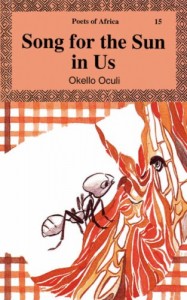 Okello Oculi is one of East Africa’s foremost and pioneering writers. Born in Uganda, his poetry belongs to the same school as that of Okot p’Bitek and Joseph Brunga. It is a school that seeks to re-assert African cultural heritage with a critique of foreign influences. His voice is both evocative of a receding Africa and a declamatory dialogue with the new Africa. There are three main themes running through this new collection: the ecology of humans, animals and the natural world; Africa’s ideological ancestory; and the interaction of political theory and literary enterprise.
Okello Oculi is one of East Africa’s foremost and pioneering writers. Born in Uganda, his poetry belongs to the same school as that of Okot p’Bitek and Joseph Brunga. It is a school that seeks to re-assert African cultural heritage with a critique of foreign influences. His voice is both evocative of a receding Africa and a declamatory dialogue with the new Africa. There are three main themes running through this new collection: the ecology of humans, animals and the natural world; Africa’s ideological ancestory; and the interaction of political theory and literary enterprise.
6. Song of Lawino & Song of Ocol – Okot p’Bitek
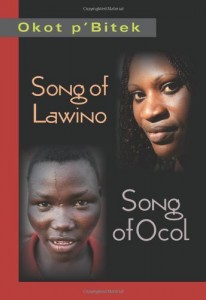 During his lifetime, Okot p’Bitek was concerned that African nations, including his native Uganda, be built on African and not European foundations. Traditional African songs became a regular feature in his work, including this pair of poems, originally written in Acholi and translated into English. Lawino’s words in the first poem are not fancy, but their creative patterns convey compelling images that reveal her dismay over encroaching Western traditions and her Westernized husband’s behavior. Ocol’s poem underlines Lawino’s points and confirms her view of him as a demeaning and arrogant person whose political energies and obsession with wasting time are destructive to his family and his community.
During his lifetime, Okot p’Bitek was concerned that African nations, including his native Uganda, be built on African and not European foundations. Traditional African songs became a regular feature in his work, including this pair of poems, originally written in Acholi and translated into English. Lawino’s words in the first poem are not fancy, but their creative patterns convey compelling images that reveal her dismay over encroaching Western traditions and her Westernized husband’s behavior. Ocol’s poem underlines Lawino’s points and confirms her view of him as a demeaning and arrogant person whose political energies and obsession with wasting time are destructive to his family and his community.
The gripping poems of Lawino and Ocol capture two opposing approaches to the cultural future of Africa at the time and paint a picture that belongs in every modern reader’s cognitive gallery.
7. The Price of Memory After the Tsunami – Mildred Kiconco Barya
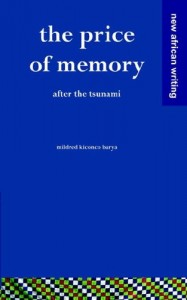 The price of Memory is a collection of 63 poems. The poems in vivid imagery uncover what happens when the pleasurable thrill of being alive is lost in the pain that settles among the familiar and refuses to say goodbye, as in the poems ‘Baggage’ and ‘Maybe.’ The subject of memory, remembrance and forgetfulness resound throughout the collection, from the private nostalgic experiences in ‘Wastelands,’ ‘The Island,’ to the collective ‘Africa re-disappointed,’ ‘Borderless Africa,’ and ‘Child of the Universe.’ In this poetry, we witness what comes out of keeping dreams in trouser pockets ridden with holes. When we send the eye to look into the future, with shock we discover that the future came.what can take away the pain and cold anger is the indomitable will that purposes to shed off memory like a cloak. Mildred Kiconco Barya is a writer and poet. She has written short-stories and essays for various publications, features and travel articles for newspapers. Her first collection of poetry titled: Men Love Chocolates But They Don’t Say won the National Award for poetry publication 2002. The Price of Memory is her second poetry collection. Her current writings highlight HIV/AIDS issues, religious cults and the pursuit of identity and belonging. Mildred lives in Uganda, her homeland and works on her novel titled: Soul of Rivers. Among her recent publications include Call me a Panda, an HIV/AIDS children’s story, Effigy Child, a short story with Commonwealth Broadcasting Association, We Seek a Face, a short story with Authorme.com and Raindrops a short story in Words from a Granary, FEMRITE publication.
The price of Memory is a collection of 63 poems. The poems in vivid imagery uncover what happens when the pleasurable thrill of being alive is lost in the pain that settles among the familiar and refuses to say goodbye, as in the poems ‘Baggage’ and ‘Maybe.’ The subject of memory, remembrance and forgetfulness resound throughout the collection, from the private nostalgic experiences in ‘Wastelands,’ ‘The Island,’ to the collective ‘Africa re-disappointed,’ ‘Borderless Africa,’ and ‘Child of the Universe.’ In this poetry, we witness what comes out of keeping dreams in trouser pockets ridden with holes. When we send the eye to look into the future, with shock we discover that the future came.what can take away the pain and cold anger is the indomitable will that purposes to shed off memory like a cloak. Mildred Kiconco Barya is a writer and poet. She has written short-stories and essays for various publications, features and travel articles for newspapers. Her first collection of poetry titled: Men Love Chocolates But They Don’t Say won the National Award for poetry publication 2002. The Price of Memory is her second poetry collection. Her current writings highlight HIV/AIDS issues, religious cults and the pursuit of identity and belonging. Mildred lives in Uganda, her homeland and works on her novel titled: Soul of Rivers. Among her recent publications include Call me a Panda, an HIV/AIDS children’s story, Effigy Child, a short story with Commonwealth Broadcasting Association, We Seek a Face, a short story with Authorme.com and Raindrops a short story in Words from a Granary, FEMRITE publication.
*Annotations from amazon.com
Films:
1. War Dance – dir. Sean Fine and Andrea Nix Fine
2. Call Me Kuchu – dir. Malika Zouhali-Worrall and Katherine Fairfax Wright
3. General Idi Amin Dada: A Self Portrait – dir. Barbet Schroeder
